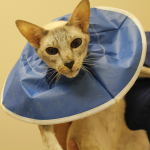Your cat has two small glands under its tail that are about the size of peas.  These glands are referred to as anal glands or scent glands. Secretions from these glands mark your cat’s stool with an odor that identifies your kitty from other cats. This helps your cat establish its territory.
These glands are referred to as anal glands or scent glands. Secretions from these glands mark your cat’s stool with an odor that identifies your kitty from other cats. This helps your cat establish its territory.
Under normal circumstances, the anal glands are emptied by natural pressure when your cat passes a bowel movement. Your cat may also spontaneously express its anal glands if alarmed or upset. The secretions inside the anal glands are normally composed of foul smelling liquid that is light gray to brown in color. It is not necessary to have your cat’s anal glands expressed unless there is a medical reason to do so.
Impaction
Uncommonly, your cat’s anal glands may become full and not express properly. This can happen if the anal gland ducts are plugged by abnormally thick secretions. Anal gland impaction can lead to infection and abscess. Often, impaction is not recognized until infection is present.
If the anal gland impaction is not serious, your veterinarian can express the glands manually.
Anal Gland Infection
Anal gland infection normally develops after impaction. You may notice your cat scooting, licking under its tail more, and you may even see visual swelling. Anal gland infection is very painful and should be treated by a veterinarian as soon as possible.
Your veterinarian will attempt to empty your cat’s infected anal glands by applying pressure. This procedure may need to be done under anesthesia as this can be painful. While under anesthesia, this will be a good time for your veterinarian to flush the anal glands and medicate with antibiotics.
Home care (after anal gland infection treatment) may require warm packing the area for 10-15 minutes twice daily. Your veterinarian may also prescribe pain medication and oral antibiotics.
Anal Gland Abscess
If your cat has an anal gland abscess, you may notice your cat acting differently. Your cat may sleep more, eat less, and be less social. If your cat is licking more under its tail, scooting, or acting painful, a trip to the veterinarian is a good idea. An abscess is extremely painful and accompanied by swelling and a dark pink to purple skin color at the site of the abscess (this may be hard to see under your cat’s fur).
An anal gland abscess is treated under anesthesia by your veterinarian. Your veterinarian will lance the abscess, flush and clean out the infected area, and may place a drain to allow drainage from the wound until healed. Home care after an abscess will be similar to care after an anal gland infection. Your cat may need warm packing, oral antibiotics and pain medication.
Anal Gland Removal
Anal glands that develop multiple abscesses over time may need to be removed. This is a procedure done under anesthesia. This procedure is not common and requires an experienced and/or board certified veterinary surgeon. After the procedure is complete your cat will not develop another anal gland abscess.
If you would like to schedule an appointment for your cat click here : http://northernilcatcliniccom.web.siteprotect.net/schedule-appointment/